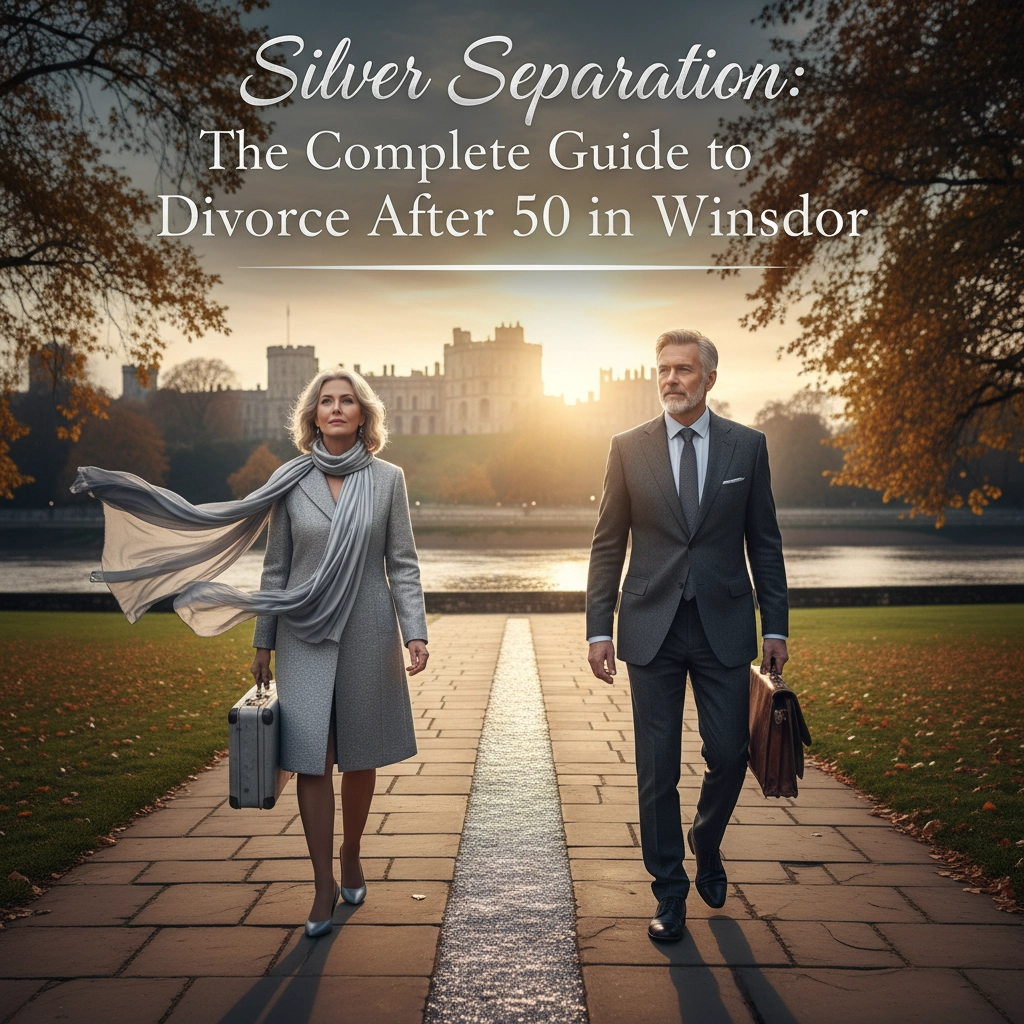The landscape of divorce is changing dramatically across the UK, and nowhere is this more evident than in the growing trend of "silver separation" – divorce among couples aged 50 and over. If you're considering or facing divorce after decades of marriage in Windsor, you're certainly not alone in this journey.
Recent statistics show that divorce rates among older adults have been steadily climbing, even as overall divorce rates have declined. This shift reflects changing social attitudes, increased life expectancy, and evolving expectations about what constitutes a fulfilling later life. Understanding what lies ahead can help you navigate this significant transition with greater confidence and clarity.
Why Silver Separation is on the Rise
The reasons behind the increase in later-life divorces are complex and deeply personal. Many couples find that after years of focusing on raising children and building careers, they've simply grown apart. The prospect of spending retirement together – potentially 20 or 30 years – can highlight incompatibilities that were previously manageable.

Some common triggers include:
- Empty nest syndrome: When children leave home, couples may discover they no longer share common interests or goals
- Retirement adjustments: The transition to spending significantly more time together can reveal fundamental differences
- Health considerations: Serious illness can either bring couples closer or highlight relationship weaknesses
- Changing priorities: What mattered in your 30s and 40s may feel less important in your 50s and beyond
- Financial independence: Particularly for women, greater financial security can provide the confidence to leave unsatisfying marriages
The key thing to remember is that choosing to end a long-term marriage doesn't represent failure – it often represents courage and a commitment to personal wellbeing.
Financial Considerations: Protecting Your Future
Perhaps the most complex aspect of silver separation involves untangling finances that have been intertwined for decades. Unlike younger divorces, there's often limited time to rebuild financial security, making careful planning absolutely crucial.
Pension Rights and Retirement Planning
Your pension rights are likely to be one of your most valuable assets. In England and Wales, pensions accumulated during marriage are considered matrimonial assets subject to division. This includes:
- Workplace pension schemes
- Personal pensions
- State pension entitlements
- SIPPS (Self-Invested Personal Pensions)
The court can make various orders regarding pensions, from simple offsetting against other assets to more complex pension sharing orders. Getting expert legal advice early in the process ensures you understand your full entitlement.
Property and Housing Decisions
The family home often represents the largest single asset in a marriage. For couples approaching or in retirement, deciding what happens to the property involves several considerations:
Selling and splitting proceeds may provide both parties with sufficient funds for separate accommodation, but consider the costs of moving and setting up new homes.
One party remaining in the property might work if they can afford the mortgage payments, maintenance, and running costs on a single income.
Delayed sale arrangements can provide stability while allowing time to plan the next steps, though these require careful legal documentation.

Spousal Maintenance in Later Life
Courts recognise that the ability to achieve financial independence decreases with age. If there's a significant income disparity between you and your spouse, maintenance payments may be necessary. For marriages lasting over 20 years, courts often consider this should continue until retirement age or beyond, depending on circumstances.
Understanding the Emotional Journey
Ending a marriage after decades together involves grieving not just the relationship, but also the shared future you'd planned. This emotional process is completely normal and shouldn't be rushed.
Common feelings include:
- Relief at finally making a difficult decision
- Grief for the loss of shared dreams and plans
- Fear about financial security and living alone
- Excitement about new possibilities and independence
- Guilt about the impact on adult children or grandchildren
Consider professional counselling or joining support groups specifically for people experiencing later-life divorce. Many find that speaking with others who understand the unique challenges provides valuable perspective and practical advice.
The Legal Process: What to Expect
Since April 2022, no-fault divorce has been available in England and Wales, which can make the process less acrimonious. This means you don't need to blame either party for the marriage breakdown – you simply need to state that it has irretrievably broken down.

The process typically involves:
- Filing the divorce application with the court
- Financial disclosure where both parties provide detailed information about assets, income, and expenditure
- Negotiating financial arrangements either through solicitors or mediation
- Finalising arrangements through a consent order or court hearing if agreement cannot be reached
For silver separations, the financial aspects often take longer to resolve due to the complexity of assets accumulated over decades. Don't be discouraged if the process takes several months or even longer – thoroughness now protects your future security.
Practical Steps to Take Early
If you're considering separation, taking certain steps early can protect your interests:
Gather financial documentation including bank statements, pension valuations, investment portfolios, and property valuations. Having this information readily available speeds up the process later.
Consider your living arrangements and whether staying in the family home short-term is practical and affordable.
Update important documents such as wills, lasting powers of attorney, and beneficiaries on insurance policies and pension schemes.
Seek professional advice from both legal and financial experts who understand the complexities of later-life divorce.
Supporting Your Adult Children
One concern many older divorcing couples share is how their decision will affect adult children and grandchildren. While this separation may come as a shock, most adult children ultimately want their parents to be happy.
Clear, honest communication about your decision – while avoiding detailed explanations about relationship problems – usually works best. Reassure them that your love for them remains unchanged and that you're committed to maintaining family relationships where possible.
Finding the Right Professional Support
Silver separation requires expertise in areas that might not apply to younger divorces. Look for professionals who understand:
- Complex pension arrangements and retirement planning
- Later-life financial planning and security
- The emotional aspects of ending long-term marriages
- Estate planning considerations

At Judge Law, we understand that facing divorce after 50 requires a different approach from handling younger couples' separations. Our experienced family law team recognises the unique financial and emotional challenges involved and provides the sensitive, expert guidance you need during this transition.
Looking Forward: Your New Chapter
While silver separation can feel overwhelming, many people discover that ending an unfulfilling marriage opens up possibilities they hadn't considered. Whether that's travel, new relationships, career changes, or simply the peace of a harmonious living situation, your 50s and beyond can be a time of renewal rather than just loss.
The key is approaching this transition with proper legal and financial advice, realistic expectations about the process, and support for the emotional journey ahead. With careful planning and the right professional guidance, you can navigate silver separation successfully and build a secure, fulfilling future.
If you're facing the possibility of divorce after 50 in Windsor, remember that you don't have to navigate this alone. Professional support can make an enormous difference in both the process and the outcome, ensuring your rights are protected and your future secured.
For expert guidance on divorce and family law matters, visit our family law services or learn more about understanding the divorce process.





